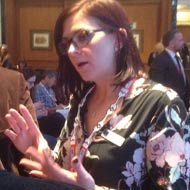Making the most of the veterinary nursing team

Kirstie Faulkner challenged audience members to review whether they are making efficient use of their nursing teams.
Kirstie Faulkner from Onswitch challenged the audience at the London Vet Show to review whether they were keeping pace with all the changes that have occurred in vet practice, especially efficient use of the nursing team.
She advocated much wider application of dedicated nurse clinics to educate clients and take action on subjects such as parasite control, pre-purchase advice for puppies and kittens, life stage nutrition and parasite control – things that were often not discussed by the reception staff or during routine 'vet consults'.
Often the problem is poor communication within the practice and the inadequate allocation of responsibility – and sufficient time – to deal more professionally with clients to make it easier for them to access and absorb the advice they really need. When this is not offered in a veterinary practice, owners will turn to alternative sources – especially the internet – which offer poor advice and ineffective products. These are missed educational and commercial opportunities for the veterinary practice.
Research from Onswitch suggests that referral to nurse clinics that specifically deal with preventive measures will increase client loyalty and enhance the practice as a business. It also helps with the socialisation and habituation of young puppies, increases the number of pets being neutered and breaks down the barriers between the practice and pet owners.
Some practices are now extending the concept of 'nurse consults' to pick up appointments which do not necessarily require a full veterinary consultation, or at least to save 'vet time' by using the nurse to carry out preliminary history taking. This is often better received by clients than practices imagine and, in many cases, provides a platform for owners to discuss issues that they are reluctant to raise with the vet.



 FIVP has shared a survey, inviting those working in independent practice to share their views on the CMA's proposed remedies.
FIVP has shared a survey, inviting those working in independent practice to share their views on the CMA's proposed remedies.